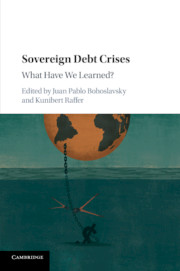Book contents
- Sovereign Debt Crises
- Sovereign Debt Crises
- Copyright page
- Dedication
- Contents
- Contributors
- 1 Introduction
- 2 Managing Public Debt Crisis in Argentina
- 3 Why Developing Countries Should Not Incur Foreign Debt
- 4 Ecuador’s 2008–2009 Debt Restructuring
- 5 Greece: An EU-Inflicted Catastrophe*
- 6 Grenada: A Small Island Developing State Needs New Ways Out of Its Debt
- 7 Iceland: A Human Rights-Sensitive Approach to Deal with Financial Crises
- 8 Indonesia’s 1997–1998 Economic Crisis
- 9 The Irish Sovereign Debt Crisis Post-2009
- 10 Short-Term Capital Controls and Malaysia’s Fast Recovery after the East-Asian Crisis
- 11 Sovereign Debt
- 12 Portugal’s Austerity Bailout
- 13 Don’t Waste a Serious Crisis*
- 14 Lessons from South Korea
- 15 The Spanish Crisis
- 16 Conclusions
- Index
8 - Indonesia’s 1997–1998 Economic Crisis
A Teachable Case Wasted
Published online by Cambridge University Press: 16 November 2017
- Sovereign Debt Crises
- Sovereign Debt Crises
- Copyright page
- Dedication
- Contents
- Contributors
- 1 Introduction
- 2 Managing Public Debt Crisis in Argentina
- 3 Why Developing Countries Should Not Incur Foreign Debt
- 4 Ecuador’s 2008–2009 Debt Restructuring
- 5 Greece: An EU-Inflicted Catastrophe*
- 6 Grenada: A Small Island Developing State Needs New Ways Out of Its Debt
- 7 Iceland: A Human Rights-Sensitive Approach to Deal with Financial Crises
- 8 Indonesia’s 1997–1998 Economic Crisis
- 9 The Irish Sovereign Debt Crisis Post-2009
- 10 Short-Term Capital Controls and Malaysia’s Fast Recovery after the East-Asian Crisis
- 11 Sovereign Debt
- 12 Portugal’s Austerity Bailout
- 13 Don’t Waste a Serious Crisis*
- 14 Lessons from South Korea
- 15 The Spanish Crisis
- 16 Conclusions
- Index
Summary
The 1990s Asian financial crisis swept through the economies that had been built reputations as being successful globalizers. Thus, it would have been very difficult to make the case that the crisis could only be attributed to domestic shortcomings and policy mistakes. Nevertheless, the dominant narrative of the crisis expressed by Western observers, which became the basis of policy reform programmes for debt distressed countries, left external factors blameless and assigned the primary responsibility to national explanations. Indonesia experienced the greatest economic reversals from the crisis. The political dislocation included the fall of the long-ensconced authoritarian Suharto regime. In leaving external factors blameless, the crisis response programme became obsessed with domestic governance failings and untimely deregulation and liberalization reforms, distracting attention from the causes that could have been remedied by immediately effective policy actions. A swift and thoroughgoing banking sector reform behind a wall provided by capital controls would have been a proper response, but the former was considered too late and the latter was never even a gleam in the eyes of policy authorities. Indonesia’s subsequent recovery, as in the case of neighbouring East Asian countries, owed much more to the rapid deterioration of investor sentiment in other regions, beginning with the Russian payments crisis of August 1998 which halted the haemorrhaging of hot money flows out of the region.
- Type
- Chapter
- Information
- Sovereign Debt CrisesWhat Have We Learned?, pp. 123 - 142Publisher: Cambridge University PressPrint publication year: 2017



